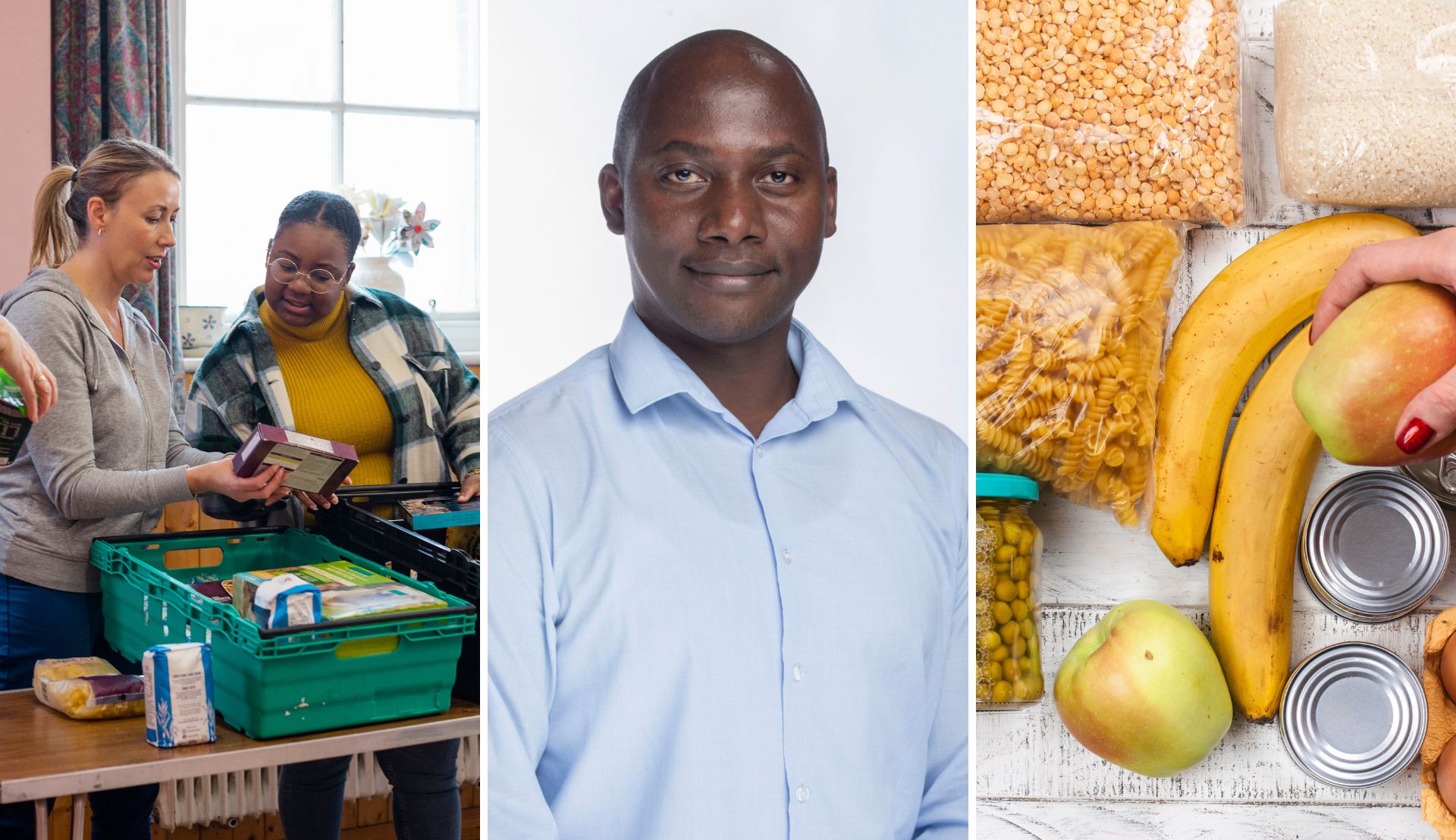Professor of nutrition sciences partners with university and local leaders to help nourish the Rutgers Health community
When Joachim D. Sackey joined the Department of Clinical and Preventive Nutrition Sciences at the Rutgers School of Health Professions in 2017, something about the Newark student body worried him: Were they food insecure?
It’s a common concern on college campuses – and not only for experts in nutritional epidemiology, like Sackey. Food insecurity, which the U.S. Department of Agriculture defines as reduced or limited access to adequate, quality nutrition, affects about 13 percent of American households. Among college students, rates can be as high as 40 percent.
To gauge the situation at Rutgers, Sackey surveyed 302 graduate students of health sciences. His findings – that 28.5 percent of respondents were food insecure – led Sackey to work with university leadership to create a food pantry for the Rutgers Health community in Newark.
This month, those efforts will be recognized by the Community FoodBank of New Jersey (CFBNJ) with a HOPE Award, given to Newark-based program partners working to enhance food security in the region.
“We at CFBNJ are proud to honor the Rutgers Health Food Pantry and pantry+ at Rutgers University-Newark with HOPE Awards at our Blue Jean Ball this year,” said Elizabeth McCarthy, President and CEO of the Community FoodBank of New Jersey.
“The award recognizes their tireless efforts to address college hunger and improve the health of students in need through nutritious food and supportive services like SNAP application assistance, hygiene product distribution, nutrition consultations and more.”
The challenges associated with college students’ food security is a trend that Sackey has been tracking for years. Decades ago, a young person could go to college, work part-time and then graduate debt free, he said. But that’s no longer the case.
“Today, students take on a lot of debt and must make lots of decisions about food.” Sackey said. “Do they eat well, or do they eat ramen so they can afford a book? It’s an impossible choice.”
This shift in food fortunes is closely tied to the rising cost of a college education. Between 1963 and 2023, adjusting for inflation, the average price for tuition, fees and room and board at a public institution rose by 130 percent, to about $20,000 a year, according to the National Center for Education Statistics. The surge in private school costs was nearly 180 percent during the same period, topping $49,000 in 2023.
Student responsibilities also have changed as more parents are attending college than ever before. A U.S. Senate report from 2022 said about a quarter of post-secondary students – some 4 million learners – have children. Seventy percent of student-parents are women and nearly two-thirds live in or near poverty.
Easing this burden is what the Rutgers Health Food Pantry was set up to do (a similar program is available to the community at Rutgers-New Brunswick, as is RU-N pantry+, which is available to Rutgers-Newark community members). Every week during the semester, Sackey and a team of volunteers distribute food, hygiene products and other items to as many as 180 students, staff and faculty.
Dried cereals, oatmeal, canned beans, soup, fish, vegetables, pasta and juice are often on offer. Other items – produce, meat and eggs – are stocked less frequently. The food bank also runs a period and diaper program to help women and parents.
Since its inception in September 2021, the food pantry has distributed more than 288,000 pounds of food, and between January 2023 and February 2024, 11,067 households – more than 35,000 people – were served.
Maintaining the food supply and expanding the client base are top goals in the years ahead, Sackey said. Rutgers donates the space for the food pantry and pays for a full-time program manager and part-time student assistant. The Community FoodBank of New Jersey provides 98 percent of the food and other items that Sackey and fellow team members distribute. The rest comes from donations.
“It’s a wonderful partnership that we have with CFBNJ, but it’s also a big risk,” Sackey said, noting that being over reliant on one source of food means the food pantry is vulnerable to supply shocks. “It would be great to broaden our base of community support.”
Originally created to aid students, the food pantry has supported staff and faculty since the COVID-19 pandemic. It was a move driven as much by strategy as by need. While staff and faculty also were food-stressed during the pandemic, Sackey said a successful operation requires an open, welcoming atmosphere.
“Stigma is a huge challenge, especially within a college population,” he said. “One way to work around this is by keeping an open-door policy. If (Rutgers) President Holloway comes, we’ll give him food. Everything is judgement-free, driven by respect and confidentiality.”
Sackey hopes to put himself out of business one day. While the food pantry provides informal guidance to students and helps connect them with other campus resources, like housing and mental health, ending food insecurity is Sackey’s goal.
He said some ways to end food insecurity include extending federal school nutrition programs beyond high school to include college students, and giving college food pantries access to food from the State Food Purchasing Program, which helps food banks and soup kitchens buy healthy food from local farmers. Other ideas include simplifying requirements for college students to be eligible for SNAP, the federal nutrition assistance program, and providing more financial support for vulnerable students, including first-generation students.
“There are so many solutions,” Sackey said. “All that’s needed is more political will to execute them.”
This article originally appeared in Rutgers Today.

